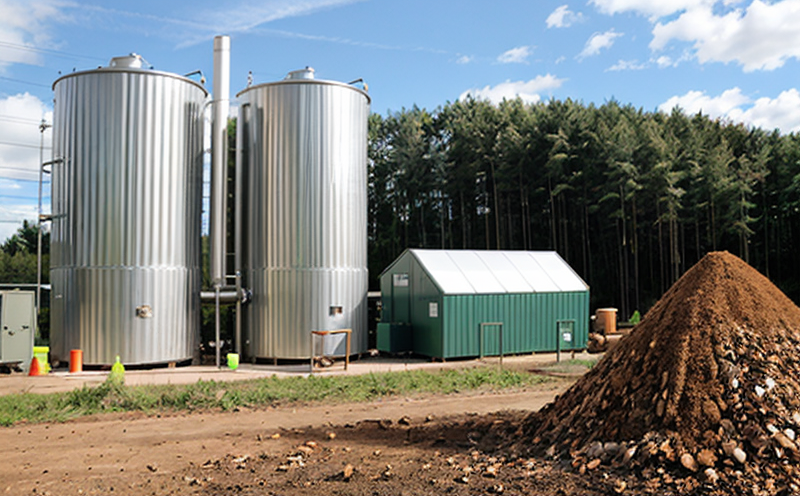EN 15446 Quality Assurance of Solid Recovered Fuels
The European Standard EN 15446 outlines the quality assurance requirements for Solid Recovered Fuels (SRF), a key component in the waste-to-energy conversion process. SRFs are derived from sorted municipal and industrial waste, making them an essential feedstock for modern incineration plants that generate energy through waste combustion.
Understanding the parameters outlined in EN 15446 is crucial for quality managers, compliance officers, R&D engineers, and procurement specialists involved in SRF production. This standard ensures consistent fuel quality by providing detailed guidelines on testing methods, acceptance criteria, and reporting protocols. By adhering to these standards, stakeholders can improve process efficiency and ensure regulatory compliance.
The test covers a wide range of parameters including ash content, calorific value, particle size distribution, and moisture content. Each parameter plays a critical role in determining the suitability of SRF for energy conversion processes. For instance, high ash content may reduce the fuel's calorific value, while inappropriate particle sizes could lead to inefficiencies during combustion.
Implementing EN 15446 requires precise specimen preparation and specialized testing equipment. Laboratories must follow stringent protocols for sample collection, storage, and analysis. This includes using advanced instrumentation such as thermal analysis systems (TGA) for calorific value determination or sieve analyzers for particle size distribution.
The standard also emphasizes the importance of continuous quality assurance through regular audits and process reviews. By leveraging this framework, organizations can enhance their production processes, ensuring that SRF meets the stringent requirements set forth by EN 15446.
Moreover, compliance with EN 15446 fosters trust among stakeholders and enhances marketability of SRF products. It demonstrates a commitment to sustainability and environmental responsibility, which is increasingly important in today’s regulatory landscape.
In summary, the implementation of EN 15446 ensures that solid recovered fuels are produced consistently with high quality standards, thereby contributing significantly to efficient waste management practices and sustainable energy generation.
Why It Matters
The importance of quality assurance in SRF production cannot be overstated. Ensuring that solid recovered fuels meet the stringent criteria set by EN 15446 is vital for several reasons:
- Enhanced Efficiency: Quality-assured SRFs can lead to more efficient energy generation, reducing operational costs and improving overall plant performance.
- Regulatory Compliance: Adhering to international standards like EN 15446 ensures that producers meet environmental regulations and avoid potential legal issues.
- Marketability: High-quality SRFs are more attractive to buyers, enhancing the reputation of manufacturers and suppliers in the waste-to-energy market.
- Sustainability: Consistent quality helps reduce emissions and promotes sustainable waste management practices.
In essence, compliance with EN 15446 is not just a regulatory requirement but also an opportunity to optimize processes and improve the overall sustainability of waste-to-energy operations.
Benefits
The adoption of EN 15446 Quality Assurance for SRFs brings numerous benefits to stakeholders in the waste management sector:
- Improved Process Efficiency: By adhering to standardized testing and quality assurance protocols, producers can optimize their processes, leading to higher fuel quality.
- Increased Market Confidence: Compliance with international standards enhances market confidence and trust in the quality of SRFs.
- Enhanced Reputation: Demonstrating commitment to quality through EN 15446 can significantly boost a company's reputation, especially among environmentally conscious consumers and stakeholders.
- Sustainability: Ensuring consistent fuel quality supports sustainable waste management practices, contributing to global environmental goals.
The benefits of implementing EN 15446 extend beyond immediate operational improvements. By fostering trust among customers and regulatory bodies, organizations can establish a strong market position and contribute positively to the environment.
Why Choose This Test
- Regulatory Compliance: Ensures adherence to international standards for solid recovered fuels.
- Enhanced Quality Assurance: Provides detailed guidelines for specimen preparation and testing.
- Process Optimization: Helps identify areas for improvement in SRF production processes.
- Market Attractiveness: Increases the appeal of products to environmentally conscious buyers.
- Sustainability: Supports sustainable waste management and energy generation practices.
- Cost Efficiency: Reduces operational costs by ensuring optimal fuel quality for combustion processes.





